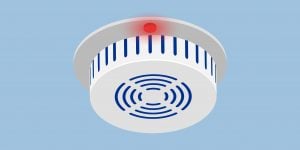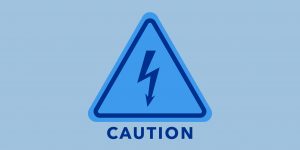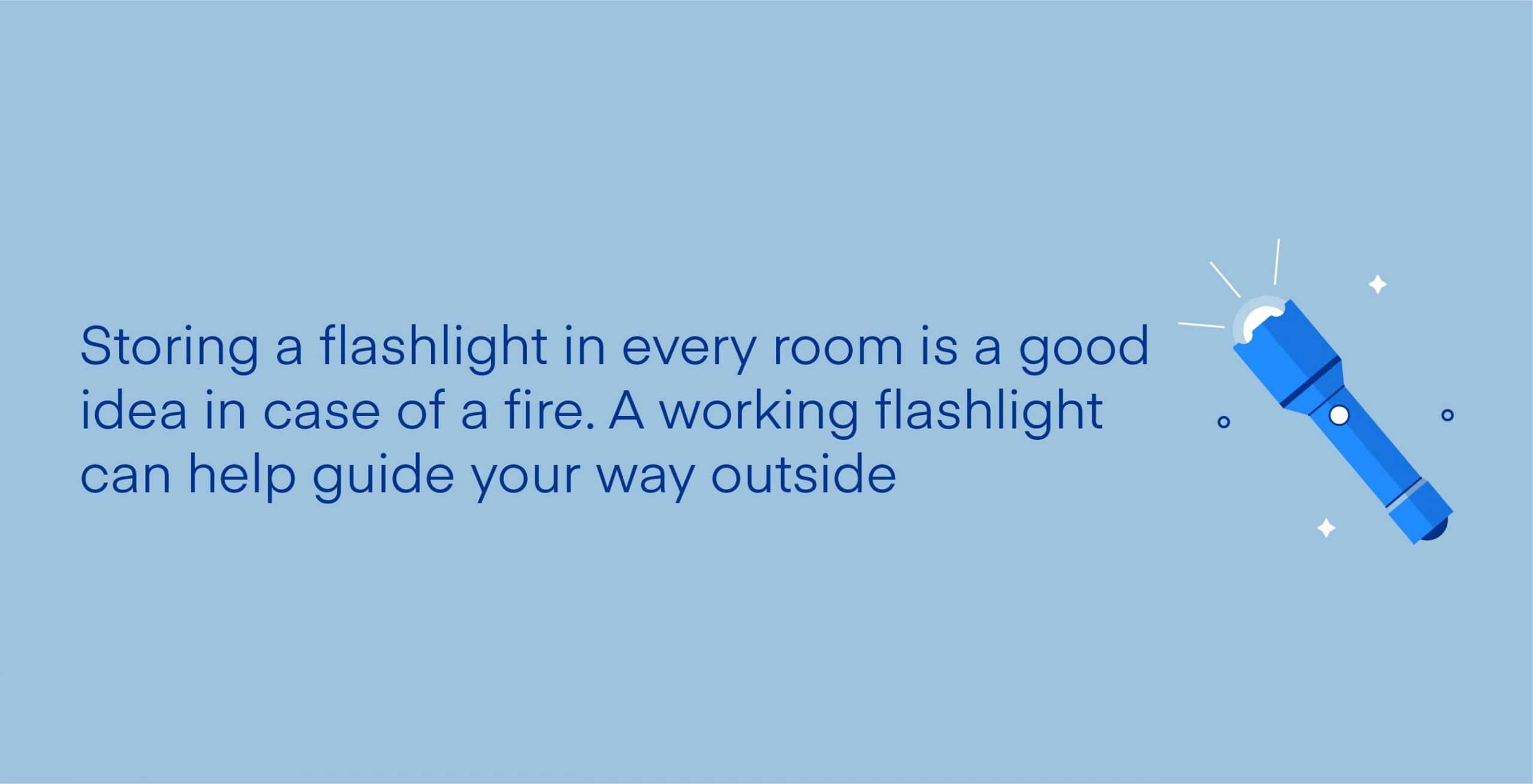Fire Safety While You Sleep
According to the Federal Emergency Management Agency, over 51 percent of residential fire-related deaths in the United States occur between 11 p.m. and 7 a.m. when most people are sleeping. If a fire starts in your home, you may have only a few minutes to get out. Worse, if you’re asleep, you may not even be aware of the danger before it’s too late. Preventative measures and early warnings can help you and your loved ones stay safe and provide a means of escape in case of a home fire.
In our article, we share fire safety tips that can keep your family safe while you sleep. Following these guidelines and taking extra precautions can save you from the damages of a disastrous fire.
Close Your Bedroom Door
 Something as simple as sleeping with your door closed can keep you safer if a fire starts. A closed door reduces toxic smoke levels and keeps the room under 100 degrees because there’s less oxygen feeding the flames. It could also give you more time to escape and slow down the fire’s progress to the rest of the house or apartment.
Something as simple as sleeping with your door closed can keep you safer if a fire starts. A closed door reduces toxic smoke levels and keeps the room under 100 degrees because there’s less oxygen feeding the flames. It could also give you more time to escape and slow down the fire’s progress to the rest of the house or apartment.
Install Smoke Alarms
 Install smoke alarms in every bedroom and hallway in the home. The sound of a smoke alarm is sure to wake you up and warn you of fire since the loud volume is louder than any alarm clock. Make sure to test every smoke detector every month and replace the batteries once a year to ensure they work.
Install smoke alarms in every bedroom and hallway in the home. The sound of a smoke alarm is sure to wake you up and warn you of fire since the loud volume is louder than any alarm clock. Make sure to test every smoke detector every month and replace the batteries once a year to ensure they work.
It’s also a good idea to use monitored smoke alarms if you’re away when a fire starts. If a fire is detected, the smoke detector will alert a nearby monitoring center to notify the local fire department.
Keep Flammable Objects Away From Heat Sources
 Keep anything that can easily burn at least three feet away from the fireplace, a space heater, candles, or a portable heater, to cut down on fire risk.
Keep anything that can easily burn at least three feet away from the fireplace, a space heater, candles, or a portable heater, to cut down on fire risk.
Never leave a room with an open flame, especially if you have young children and pets. Candles can be knocked over, and nearby items could catch fire if too close to the flame. Too often, fires are caused by unattended flames.
Before you go to bed, turn off any heaters, and ensure all candles and fireplaces are thoroughly put out. It only takes a single spark to start a full-burning flame.
Electrical Safety
 If a fire starts in the bedroom, the problem most likely stems from electrical issues. To avoid this, don’t use multiple extension cords in one outlet. Also, try not to run electrical cords under the bed. The limited space could cause heat buildup and increase the chance of a fire.
If a fire starts in the bedroom, the problem most likely stems from electrical issues. To avoid this, don’t use multiple extension cords in one outlet. Also, try not to run electrical cords under the bed. The limited space could cause heat buildup and increase the chance of a fire.
Hide Matches and Lighters
 If left unattended, matches and lighters can become toys for young children. According to the National Fire Protection Association, about 49,300 fires occurred due to children playing with fire, causing over 80 deaths. You must remain vigilant and keep matches and lighters out your children’s reach.
If left unattended, matches and lighters can become toys for young children. According to the National Fire Protection Association, about 49,300 fires occurred due to children playing with fire, causing over 80 deaths. You must remain vigilant and keep matches and lighters out your children’s reach.
Clean Home Vents
 Over time, vents can accumulate dirt and debris, flammable materials that can catch fire in the home. Running a duster over vent openings at least once a month and cleaning your home vents once a year can minimize fire risk.
Over time, vents can accumulate dirt and debris, flammable materials that can catch fire in the home. Running a duster over vent openings at least once a month and cleaning your home vents once a year can minimize fire risk.
Also, replace vent filters periodically per the instructions—this also goes for the filters in air purifiers, also. These filters attract dust mites and allergens, and over time, these flammable materials build up. Not only does replacing the filters with new ones provide better safety, but it maintains cleaner air.
Fire Extinguishers On Hand
 Have at least one fire extinguisher on every level of your home. It’s also a good idea to keep a fire extinguisher in the garage, laundry room, and kitchen. Make sure you store the fire extinguisher where you can quickly grab and use it in case of an emergency. Apartment buildings usually have one to two fire extinguishers on every floor level, depending on the level’s size.
Have at least one fire extinguisher on every level of your home. It’s also a good idea to keep a fire extinguisher in the garage, laundry room, and kitchen. Make sure you store the fire extinguisher where you can quickly grab and use it in case of an emergency. Apartment buildings usually have one to two fire extinguishers on every floor level, depending on the level’s size.
Study the extinguisher instructions so if a fire happens, you know how to operate it. Teach your family members too, so if a fire occurs when you’re not home, your family members know what to do.
Flashlights in Every Room
 Storing a flashlight in every room is an excellent idea in case of a fire. When you wake up in a smoky room, it is difficult to navigate your way to safety. A working flashlight can help guide your way outside.
Storing a flashlight in every room is an excellent idea in case of a fire. When you wake up in a smoky room, it is difficult to navigate your way to safety. A working flashlight can help guide your way outside.
Don’t rely on your phone’s flashlight—we suggest purchasing a real flashlight with batteries for every room; and if possible, flashlights with emergency settings. Using a flashing light can show firefighters where you are if you’re trapped inside your home.
Clean the Chimney
 If you have a chimney, it’s important to keep the fireplace clean and sweep away any loose particles or debris. You should also have your chimney cleaned at least once a year, depending on how often you use it to clean out any buildup.
If you have a chimney, it’s important to keep the fireplace clean and sweep away any loose particles or debris. You should also have your chimney cleaned at least once a year, depending on how often you use it to clean out any buildup.
Anytime you burn wood or coal in your fireplace, it leaves a leftover residue that sticks to the inside of your chimney. This material is called creosote, a carbonaceous chemical that can quickly build up and restrict airflow. Creosote deposits are also highly flammable and the leading cause of chimney fires.
Have an Action Plan
 It’s crucial that you and your family create an action plan in case of a fire. Doing so will prepare you and keep you from panicking in an emergency.
It’s crucial that you and your family create an action plan in case of a fire. Doing so will prepare you and keep you from panicking in an emergency.
Plan for worst-case scenarios and practice your action plan so you and your family members know what to do in case of a fire. Establish a few escape routes in case one is blocked.
Here’s an example of a home fire escape plan:
- If you wake up from a fire, you need to get out immediately and call for help.
- Stay low to the ground if there’s a lot of smoke—you’ll be able to breathe easier and see better.
- Feel a closed door before opening it, but never touch the door handle first! Metal heats up quickly and can burn you. Instead, feel the wood of the door. If the wood is warm, find another route. If the wood is cool, open the door slowly.
- If you can’t escape the room, use a rolled-up towel, clothing, or bedding to block the space under the door. Grab a flashlight or brightly colored article of clothing to signal firefighters.
- If your only exit is through a window and it won’t open, break the window and place towels, bedding, or clothing over the broken glass to reduce injury.
- Stop, drop, and roll if your clothing catches fire. If you get burned, wait until after you escape the building. Douse the wound in cool water, then cover with a clean, dry cloth and wait for medical assistance.

FAQs
Will a fire wake you up?
Smoke alarms are essential because they’ll wake you up the second the system detects a fire. When you’re asleep, there’s a very low chance a fire will wake you up, and by then, it could be too late. Smoke is the actual killer—it’s completely silent, and inhaling the toxic fumes causes most fire-related deaths.
Is it safe to sleep with your bedroom door open or closed?
It’s safer to sleep with your bedroom door closed. If a fire happens, a closed door gives the fire less oxygen, preventing the flames from growing. A closed door also keeps the room temperature from climbing and provides a rough shield against toxic fumes and smoke. According to the NFPA, most house fire-related deaths are not caused by burns, but by smoke inhalation. Closing your door at night could save your life in the event of a fire.
Can a fireplace fire cause carbon monoxide poisoning?
A fire in the fireplace could cause carbon monoxide poisoning if your chimney isn’t cleaned regularly. Each time you light a fire, the residue builds up inside the chimney, slowly blocking airways. Instead of going outside, carbon monoxide could spread into your home, poisoning you and your family as you sleep.
Can I go to sleep with a fire in the fireplace?
You should never go to sleep while a fire is in the fireplace. It may seem safe—after all, the fire is small and controlled behind a metal grate. What could happen? Too often, all it takes is a small spark before a home goes up in flames. Before going to bed, make sure the fire is completely extinguished.
What should you not do during a fire?
Never ignore a smoke alarm. If you wake up hearing a smoke detector going off, immediately do everything you can to get out of the building. Stay low to the ground to reduce smoke inhalation and never grab a door handle without feeling the door first. Unless you’re trained to do so, don’t try to extinguish a fire on your own. You could end up feeding the flames and reducing precious time to escape.
Conclusion
To prevent the possibility of a fire in the home while you sleep, it’s important to be aware of potential danger. Taking the necessary precautions can reduce the risk of a fire starting in your home. For example, installing smoke detectors can give you and your family an early warning should a fire occur. The alarm will wake you up and give you the time you need to escape.
Above all else, make sure you have an action plan in case a fire does happen, so you and your family know where to go and how to get out of the house to safety.
Original article can be found here - https://amerisleep.com/blog/fire-safety-tips-while-you-sleep/
Recent Posts
-
Halloween Decor Safety: Protecting Costumes, Props & Haunted Houses with Fire Retardants
Halloween is one of the most creative holidays of the year. From glowing jack-o’-lanterns to elabora …Nov 5th 2025 -
Cost-Benefits of Investing in Fire Retardant Coatings
In today’s construction and safety-conscious environment, protecting buildings, assets, and people h …Nov 5th 2025 -
Fire Resistant vs Fire Retardant vs Intumescent: What's The Difference
When it comes to fire safety, the terms fire-resistant, fire-retardant, and intumescent are often us …Nov 5th 2025



